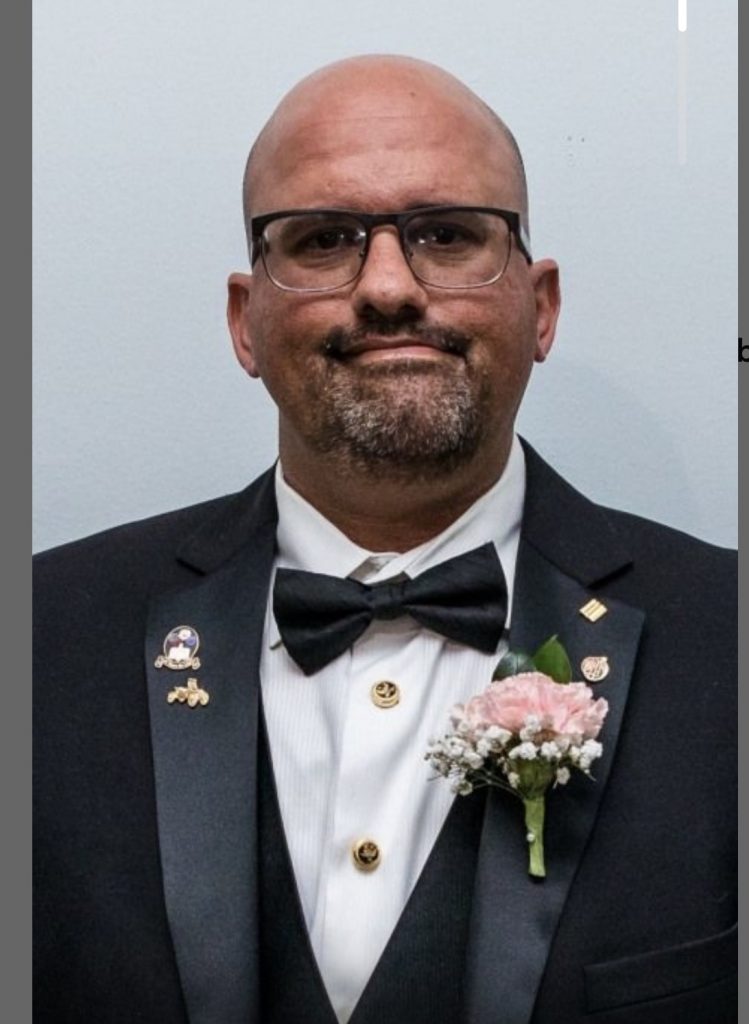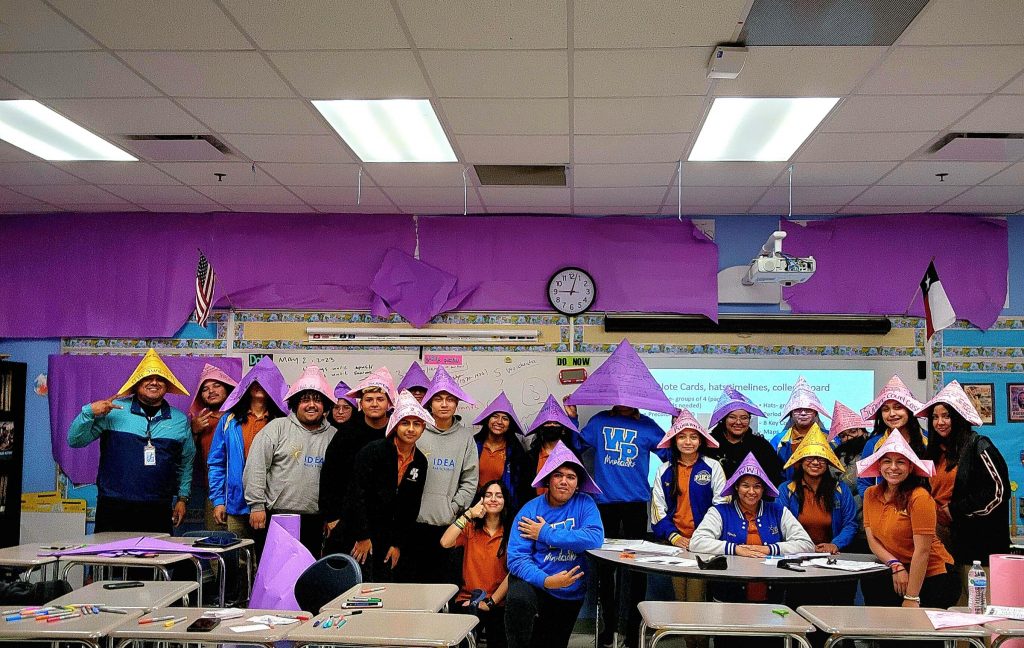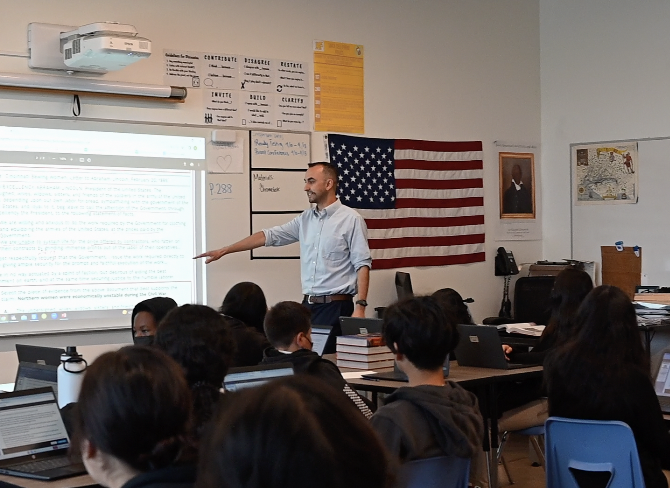On our social media this week for Teacher Appreciation Week, we featured teachers at some of our partner schools around the country who are absolutely CRUSHING IT! We are so grateful to work with such inspiring teachers and want to take some time to honor them here, too.
Following each teacher introduction, we will highlight some of their thoughts on history education through a mini Q+A.
First up for Teacher Appreciation Week: Dr. Carlo Aaron Purther. Dr. Purther currently is the department head at Birmingham Community Charter High School and has been teaching for 21 years. This year teaches US History, US History EL, AP Euro, and Government. To add to that he also teaches at Cal State University, Northridge. We love how we constantly integrates historical writing and analysis into his classes. We appreciate you, Dr. Purther!

Q: Why do you think it is important to teach your students to think historically?
A: The mission is to help students become responsible democratic citizens. In addition to the number of skills one needs to be an effective citizen such as supporting an argument with textual evidence like they do with DBQs, one should also be able to think historically. That is, students should be able to understand the context and contingency of situations to better understand their place in the present and future. Additionally, students should be able to identify the cause and effect of events, how things change over time, and be able to comprehend the complexities of situations. All of this leads to students becoming responsible democratic citizens.
Q: Where would you like to see history education go in the future?
A: I would like to see (1) more cross-curriculum skill-based work with other subjects (2) students being service focused (3) focus on depth of historical events based on interests and/or needs of a local community.
Q: Share with us a bright spot of student thinking from your classroom!
A: Because of our school’s work with Thinking Nation, students have improved in (1) summarizing documents (2) being able to explain how textual evidence supports a thesis (3) and connecting what they learned from the writing an essay to event in another historical era.
Moving across the country to Michigan, we want to highlight the work of Uplift Michigan Online High School teacher, Jenifer Gould! Mrs. Gould is an incredibly reflective educator who continuously pushes her students to think deeply about the past. We appreciate you, Mrs. Gould!

Q: Why do you think it is important to teach your students to think historically?
A: Teaching students to think historically is so important as it teaches them lifelong skills of analyzing, thinking objectively, and making sure they have evidence to support their position. Especially in the current climate we live in, it is more important than ever that students have these skills.
Q: Where would you like to see history education go in the future?
My hope is that history education would start focusing much more on primary sources, analysis, and critical thinking, versus memorization and multiple-choice answers. Teaching history using primary sources is so rewarding as students see historical events in an entirely new light.
Q: Share with us a bright spot of student thinking from your classroom!
It has been so fun, rewarding, and worth the effort to incorporate and use primary source documents in class as I have seen “light bulb” moments in several students as they have learned about historical events that they previously learned about, but now are seeing it from a totally different perspective.
From the Mitten State to the Lone Star State, we are going to the classroom of Gabriel Hernandez at Idea Public Schools in Weslaco, TX. Mr. Hernandez is a go-getter and risk taker that cares deeply for his students. We appreciate you, Mr. Hernandez!

Q: Why do you think it is important to teach your students to think historically?
A: It is important for our students to think historically and view concepts through a historical lens to ensure we grasp it through the interpretation of then and now. To make sure history does not repeat itself, since history is a generation away from being lost.
Q: Where would you like to see history education go in the future?
A: History in the future should be something we all carry with us, and be showcased through multiple platforms, topics and not just what is required, but special topics, narratives, and interpretation from scholars and others that will bring more attention to History education.
Q: Share with us a bright spot of student thinking from your classroom!
A: A bright spot of student thinking in my classroom consists of peer feedback, pair shares and a WATCHA wall (oh look at this work/Spanish translation) that showcases student work and achievement. The photo that I attached is one of our last days of review, we build Key Concept hats and students were to showcase all day to other staff and students! I apologize for the walls being covered, since it was right before exams, we are not allowed to have any work up (timelines, anchor charts and such).
Finally, for Teacher Appreciation Week, we’d like to (again) highlight the work of Abraham Martinez at Stella Middle Charter Academy in Los Angeles, CA. Mr. Martinez has been teaching for 7 years and continuously reflects on how to best empower his students to think historically. We appreciate you, Mr. Martinez!

Q: Why do you think it is important to teach your students to think historically?
A: Teaching students to think historically is important as it gives them a framework and thought process to approach primary sources in an academic setting. I also believe that this framework can be applied outside of the history classroom into other content areas and beyond. Ultimately, it helps them become better people and gives them the problem solving skills that they will need throughout their entire lives.
Q: Where would you like to see history education go in the future?
A: This is a tough one. I believe that history education has moved into the right direction in the last 20 years by focusing on the historical thinking aspect of the discipline in addition to the names, dates, and facts. However, I don’t think that everyone in education seems to see this importance. I would like for education leaders to highlight and recognize the importance that history education plays in the role of developing the “whole student”. Perhaps this may be a reflection of my thoughts on education as a whole, but we need to make sure that we are developing better humans that are able to think for themselves, not just for academic purposes.
Q: Share with us a bright spot of student thinking from your classroom!
A: One of the brightest moments that I witnessed this year was when we had a socratic seminar on the Monroe Doctrine. Students were so excited to discuss what would normally be a rather “boring” topic according to an 8th grader. My 4th period class was so engaged in the conversation that they chose to stay in during lunch to continue the discussion. It was amazing to see their excitement and passion.
Take some time today to celebrate the teachers in your life for Teacher Appreciation Week. And all the teachers out there: Know that we see you and appreciate how much you do for the students in your room.